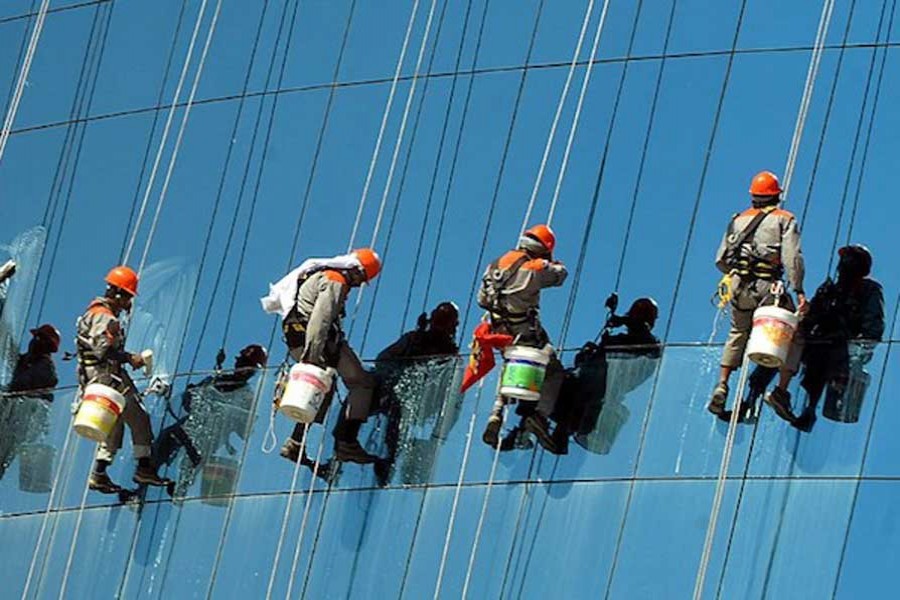From what one gathers reading news reports, job prospect for expatriates in the Kingdom of Saudi Arabia (KSA) is heading for the worst ever scenario. There were prior indications from Saudi official sources in recent times about slapping a sharp raise on the annual akama fee, a crucial job requirement for expat workers, and prohibition of foreign workers from engaging in a number of employment sectors. The indications have been given a practical shape with the announcement of some major decisions by the Saudi government.
This is bad news, particularly in view of the fact that the country's overseas employment dropped by more than 24 per cent in last seven months compared with that of the corresponding period last year. According to the Bureau of Manpower Employment and Training (BMET), 451,536 workers went abroad with jobs during the period between January and July of the current year, as against 596,705 during the same period in 2017.
Although recruitment of workers from Bangladesh declined in major Middle Eastern job destinations, the move now being taken by the KSA is potentially threatening to future manpower export to that country. Not just for Bangladeshi expatriates--who are mostly in the unskilled employment bracket--the new decision, according to observers, is going to harshly tell upon workers from most countries. As Saudi companies struggle with slower business and authorities impose more fees and taxes on foreigners, the biggest Arab economy is losing much of its appeal to expats. The UAE-based daily The Khaleej Times noted the apprehension with the heading 'Expatriate Workers Leaving Saudi Arabia in Droves'. The newspaper termed it an exodus that started since the middle of the current year, and feared it would continue in larger numbers in the months ahead.
Two reasons are commonly cited for the situation-- 1) Saudi unemployment rate increases to 12.9 per cent in the first quarter of the current year; and 2) creating jobs for Saudis is a key target for the government. The number of foreign workers in the KSA declined by 6.0 per cent to 10.2 million in the first quarter of 2018 compared to the previous year, taking the cumulative drop over the five past quarters to about 700,000, according to official data released this month by the Saudi government. The losses in the first quarter were in sectors including construction -- usually dominated by low-cost labourers -- as well as trade and manufacturing. But the data also show unemployment among Saudi nationals rising to 12.9 per cent, underscoring the struggle to create jobs as the economy gradually recovers from the economic slowdown since the financial crisis in 2009.
Creating jobs for the Saudis is a priority for Crown Prince Mohammed bin Salman, the driving force behind the country's plan to reduce its dependence on oil. Under the National Transformation Programme, the government has targeted an unemployment rate of 9.0 per cent by 2020, according to data on the website of the programme.
In 2013, KSA introduced its first levy payable by employers for every foreign employee over and above a 1:1 ratio with Saudi employees. This measure has now been supplemented by a new fee payable by employers from January 1, 2018 for each foreign employee employed regardless of the ratio of foreign employees to Saudi employees. Together with the dependant levies introduced on 1 July 2017, this new measure is likely to have an impact on the Saudi labour market and employers' operating costs in the Kingdom.
A new Saudi plan under the name 'Saudization' of jobs for elimination of expatriate labour and implementation of the plan to return Saudi labour to work has been set in motion. This is within the framework of a new methodology to improve the advancement of the Saudi economy. The KSA Ministry of Labour announced that in the coming months, implementation of the "Saudization" will debar non-Saudis from engaging in twelve employment sectors. In this regard, the ministry confirmed that it would prohibit, starting from the new Hijri year 1440, four activities on non-Saudis.
In a related context, the Saudi Ministry of Labour will start with the beginning of the new Hijri year (12 September 2018), to prohibit the work of non-Saudis in any jobs in shops of cars and motorcycles, clothing stores, children's clothing and men's supplies, and home furniture and shops for household utensils. The ministry added that in January 2019, non-Saudis will be banned from sectors like electrical and electronic appliances, watches and eyewear shops. From May 2019, non-Saudis will be banned from hardware stores, medical equipment, construction material shops, auto parts shops, carpet shops of all kinds and confectionery shops.
So, it's more or less a clear roadmap up until 2020 meant for creating more jobs for Saudi nationals at the expense of expatriate workers. Although the Bangladeshi workers, a vast majority of whom are engaged in menial works across the KSA, will not be directly affected by the work ban, they will find it extremely difficult to pay the enhanced fees with their petty earnings--500-600 riyals a month. Thus, while workers from many countries will be hard hit, those from Bangladesh will have very little or even no charm at all to remain in the KSA. A really hard time ahead for the expat workers in that country.
[email protected]


